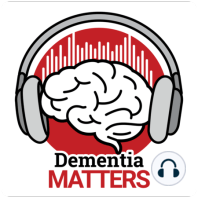32 min listen
Better Now than Never: Quit Smoking to Reduce Your Risk for Alzheimer’s Disease
FromDementia Matters
ratings:
Length:
23 minutes
Released:
Aug 3, 2021
Format:
Podcast episode
Description
Researchers have produced many studies on how smoking affects parts of the body, such as the lungs or heart, but what about the brain? In today’s podcast, Adrienne Johnson, PhD, discusses her research on cigarette smoking and risk for dementia and Alzheimer’s disease. As part of a 2021 study, she found a person’s risk for dementia and Alzheimer's disease can be affected by how recently they’ve smoked. Diving into her research, the effects of smoking on different communities, and resources to support current smokers as they quit, Dr. Johnson details the impact of smoking on the brain and her hopes to develop new interventions to motivate smokers to quit for good.
Guest: Adrienne Johnson, PhD, assistant scientist at the University of Wisconsin Center for Tobacco Research and Intervention
Episode Topics
1:17 What sparked your interest in studying the effects of cigarette smoking and, particularly, how it affects cognitive decline?
3:47 What are the effects of smoking on Alzheimer’s disease risk and/or general cognitive decline?
5:28 Why do you think there’s a difference in risk levels for Alzheimer’s disease and then for dementia?
6:27 Are there other things you can share about what you have found with your preliminary studies on smoking as a risk factor for Alzheimer’s disease?
8:38 You haven’t found a quantity relationship between the amount a person smokes and their risk for Alzheimer’s disesase, but rather a relationship based on smoking recency. Could you describe that further?
11:12 You’ve also done work on how there’s more disadvantaged communities that might be suffering from tobacco use compared to others. Can you speak on that?
13:01 How can caregivers and/or family motivate or support current smokers so that they can quit?
14:25 Is there a difference in a population that already has cognitive impairment? Do you have different strategies that we might use to support those individuals?
18:16 What are you looking to study in the future?
19:21 Can you share some resources where listeners can get help to stop smoking or where they can find resources for a loved one?
Find Dementia Matters online
Follow us on Facebook
Follow us on Twitter
Show Notes
Read Dr. Adrienne Johnson’s biography on the UW Center for Tobacco Research and Intervention (UW-CTRI) website.
To learn more about the UW Center for Tobacco Research and Intervention (UW-CTRI) and the work they do, find them on their website, Twitter, Facebook, YouTube, and Instagram.
Find resources on how to quit smoking here:
Learn more information about smoking, vaping, and how to quit at https://ctri.wisc.edu
1-800-QUIT-NOW is a national smoking cessation quitline. Though it’s resources vary from state to state, in Wisconsin they can provide callers with free evidence-based evidence-based smoking cessation medications and a free coaching session to help you quit.
Smokefree.gov is a website with a variety of resources, including texting programs, quit plans, mobile apps, and information on how to quit for specialty populations.
Talk to primary care providers for prescribed medication and counseling for quitting smoking
Guest: Adrienne Johnson, PhD, assistant scientist at the University of Wisconsin Center for Tobacco Research and Intervention
Episode Topics
1:17 What sparked your interest in studying the effects of cigarette smoking and, particularly, how it affects cognitive decline?
3:47 What are the effects of smoking on Alzheimer’s disease risk and/or general cognitive decline?
5:28 Why do you think there’s a difference in risk levels for Alzheimer’s disease and then for dementia?
6:27 Are there other things you can share about what you have found with your preliminary studies on smoking as a risk factor for Alzheimer’s disease?
8:38 You haven’t found a quantity relationship between the amount a person smokes and their risk for Alzheimer’s disesase, but rather a relationship based on smoking recency. Could you describe that further?
11:12 You’ve also done work on how there’s more disadvantaged communities that might be suffering from tobacco use compared to others. Can you speak on that?
13:01 How can caregivers and/or family motivate or support current smokers so that they can quit?
14:25 Is there a difference in a population that already has cognitive impairment? Do you have different strategies that we might use to support those individuals?
18:16 What are you looking to study in the future?
19:21 Can you share some resources where listeners can get help to stop smoking or where they can find resources for a loved one?
Find Dementia Matters online
Follow us on Facebook
Follow us on Twitter
Show Notes
Read Dr. Adrienne Johnson’s biography on the UW Center for Tobacco Research and Intervention (UW-CTRI) website.
To learn more about the UW Center for Tobacco Research and Intervention (UW-CTRI) and the work they do, find them on their website, Twitter, Facebook, YouTube, and Instagram.
Find resources on how to quit smoking here:
Learn more information about smoking, vaping, and how to quit at https://ctri.wisc.edu
1-800-QUIT-NOW is a national smoking cessation quitline. Though it’s resources vary from state to state, in Wisconsin they can provide callers with free evidence-based evidence-based smoking cessation medications and a free coaching session to help you quit.
Smokefree.gov is a website with a variety of resources, including texting programs, quit plans, mobile apps, and information on how to quit for specialty populations.
Talk to primary care providers for prescribed medication and counseling for quitting smoking
Released:
Aug 3, 2021
Format:
Podcast episode
Titles in the series (96)
Dentistry and Dementia: The Importance of Caring for Oral Health: Elisa Ghezzi, DDS, PhD, joins the podcast to discuss the importance of maintaining oral health throughout one’s life, and especially as one grows older. Discussing the effects of oral health on our systemic health, oral health’s connection to dysphag... by Dementia Matters
